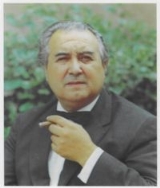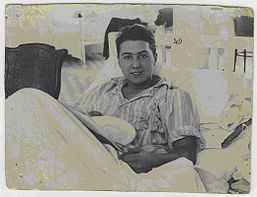
José Manuel Castañón
Encyclopedia

Spain
Spain , officially the Kingdom of Spain languages]] under the European Charter for Regional or Minority Languages. In each of these, Spain's official name is as follows:;;;;;;), is a country and member state of the European Union located in southwestern Europe on the Iberian Peninsula...
writer
Writer
A writer is a person who produces literature, such as novels, short stories, plays, screenplays, poetry, or other literary art. Skilled writers are able to use language to portray ideas and images....
born in Pola de Lena, Asturias
Asturias
The Principality of Asturias is an autonomous community of the Kingdom of Spain, coextensive with the former Kingdom of Asturias in the Middle Ages...
. Although he fought in Francisco Franco
Francisco Franco
Francisco Franco y Bahamonde was a Spanish general, dictator and head of state of Spain from October 1936 , and de facto regent of the nominally restored Kingdom of Spain from 1947 until his death in November, 1975...
’s 1936 military uprising he was very soon disappointed with Franco’s regime and in 1957 left for a 20- year exile in Venezuela
Venezuela
Venezuela , officially called the Bolivarian Republic of Venezuela , is a tropical country on the northern coast of South America. It borders Colombia to the west, Guyana to the east, and Brazil to the south...
. His best-known novel “Moletu-Voleva”, published in Madrid
Madrid
Madrid is the capital and largest city of Spain. The population of the city is roughly 3.3 million and the entire population of the Madrid metropolitan area is calculated to be 6.271 million. It is the third largest city in the European Union, after London and Berlin, and its metropolitan...
in 1956, a story about the crazy lust for money, was very much acclaimed.
Biography
José Manuel Castañón was born in Pola De Lena, AsturiasAsturias
The Principality of Asturias is an autonomous community of the Kingdom of Spain, coextensive with the former Kingdom of Asturias in the Middle Ages...
. He was the third of seven children of Guillermo Castañón, a lawyer, and Berta de la Peña
Peña
Peña, meaning "rocky outcrop" or "rocky summit" in the Spanish language , may refer to:-Mountains:*Peña Montañesa, a mountain in the Pre-Pyrenees, Aragon, Spain*Peña de los Enamorados, a mountain near Antequera, Andalusia, Spain...
. He was very much influenced by his father. He had a happy childhood life, liked to read books in his father’s library, and at a very young age began to feel the calling to be a writer.
At the outbreak of the Spanish Civil War
Spanish Civil War
The Spanish Civil WarAlso known as The Crusade among Nationalists, the Fourth Carlist War among Carlists, and The Rebellion or Uprising among Republicans. was a major conflict fought in Spain from 17 July 1936 to 1 April 1939...
, he left secretly his parents' home, and enlisted himself in the Infantry
Infantry
Infantrymen are soldiers who are specifically trained for the role of fighting on foot to engage the enemy face to face and have historically borne the brunt of the casualties of combat in wars. As the oldest branch of combat arms, they are the backbone of armies...
. He was severely injured (he lost the use of his right hand) but Castañón still had the strength to return to the front. He was promoted to the rank of
lieutenant and in 1941 volunteered in the Blue Division
Blue Division
The Blue Division officially designated as División Española de Voluntarios by the Spanish Army and 250. Infanterie-Division in the German Army, was a unit of Spanish volunteers that served in the German Army on the Eastern Front of the Second World War.-Origins:Although Spanish leader Field...
. He returned to conclude his studies and became a lawyer like his father. In 1942 he married his first-cousin Nieves Escalada; they had five children. In 1945 he graduated from Law School at the University of Oviedo
University of Oviedo
The University of Oviedo is a public university in Asturias . It's the only university in the region. It has three campus and research centres, located in Oviedo, Gijón and Mieres.-History:...
. Castañón worked as a lawyer in private practice for some years in Oviedo
Oviedo
Oviedo is the capital city of the Principality of Asturias in northern Spain. It is also the name of the municipality that contains the city....
. Unwilling to be part of the Franco
Francisco Franco
Francisco Franco y Bahamonde was a Spanish general, dictator and head of state of Spain from October 1936 , and de facto regent of the nominally restored Kingdom of Spain from 1947 until his death in November, 1975...
’s regime due to the unfair treatment of defeated Republicans and to discriminatory legal procedures, he started expressing his discontent. He protested openly against the dictatorship, calling for a just treatment to family members of Republicans killed in the war and to War Disable Republican fighters and their families. As a result he was imprisoned, in 1953.
In prison he wrote his first novel Moletu-Voleva or "The insanity for the lust of dollars", a tragic-comic satire, inspired by the personality of one of the jail recluses and his mad pursuit for easy-coming money. The book, published in 1956, received very warm critics and it was considered full of originality and transcendence.
In 1957 he also published Bezana Roja.
By that time, he had already decided going into self-exile, considering incompatible his profession as a freelance writer with the Franco’s dictatorship. In 1957, he resigned his infantry captain rank and addressed a letter to the Spanish Government requesting that his War Veteran’s pension be paid to a War Disable Republican, and fled to France
France
The French Republic , The French Republic , The French Republic , (commonly known as France , is a unitary semi-presidential republic in Western Europe with several overseas territories and islands located on other continents and in the Indian, Pacific, and Atlantic oceans. Metropolitan France...
. From there he went to Caracas
Caracas
Caracas , officially Santiago de León de Caracas, is the capital and largest city of Venezuela; natives or residents are known as Caraquenians in English . It is located in the northern part of the country, following the contours of the narrow Caracas Valley on the Venezuelan coastal mountain range...
, Venezuela
Venezuela
Venezuela , officially called the Bolivarian Republic of Venezuela , is a tropical country on the northern coast of South America. It borders Colombia to the west, Guyana to the east, and Brazil to the south...
. Two years later his family joint him.
In Venezuela he sustained his family working exclusively as a writer. Most of his literary work was published in Caracas. In 1987 he received de Andres Bello
Andrés Bello
Andrés de Jesús María y José Bello López was a Venezuelan humanist, poet, lawmaker, philosopher, educator and philologist, whose political and literary works constitute an important part of Spanish American culture...
Order from the Government of Venezuela.
José Manuel Castañón was a passionate lover of poetry. He had an astounding ability to memorizing poems; he knew an extraordinary number of poems by heart, and enjoyed reciting them to audiences. He wrote a book about his beloved Peruvian poet Cesar Vallejo
César Vallejo
César Abraham Vallejo Mendoza was a Peruvian poet. Although he published only three books of poetry during his lifetime, he is considered one of the great poetic innovators of the 20th century in any language. Thomas Merton called him "the greatest universal poet since Dante"...
: Passion for Vallejo. In 1983, he was named adoptive son of Santiago de Chuco, Vallejo
Vallejo
Vallejo is a common Spanish lastname. There are various places in the Spanish provinces of Burgos, León, and Cantabria named Vallejo. The name seems to have been rooted as a diminutive of valle...
’s birthplace.
While in the Blue Division
Blue Division
The Blue Division officially designated as División Española de Voluntarios by the Spanish Army and 250. Infanterie-Division in the German Army, was a unit of Spanish volunteers that served in the German Army on the Eastern Front of the Second World War.-Origins:Although Spanish leader Field...
he had kept a diary, which remained inedit for many years. The book was published in 1991 under the title: The Diary of an Adventure.
He wrote, as well, books on his ideology, political beliefs, and his inner struggle.
In 1977, he returned to Madrid
Madrid
Madrid is the capital and largest city of Spain. The population of the city is roughly 3.3 million and the entire population of the Madrid metropolitan area is calculated to be 6.271 million. It is the third largest city in the European Union, after London and Berlin, and its metropolitan...
, when in Spain
Spain
Spain , officially the Kingdom of Spain languages]] under the European Charter for Regional or Minority Languages. In each of these, Spain's official name is as follows:;;;;;;), is a country and member state of the European Union located in southwestern Europe on the Iberian Peninsula...
had already disappeared all vestige of the dictatorship. He died June 6, 2001.
Castañón was predeceased by his wife and a son, and is survived by four daughters.
Major works
- Moletu-Voleva (1956)
- Bezana Roja (1957)
- Andres Cuenta su Historia (1962)
- Encuentro con Venezuela (1962)
- Confesiones de un vivir absurdo (1959)
- Una Balandra encalla en Tierra firme (1958)
- Cuba hablo contigo (1989)
- Cuba sigo Hablando contigo(1993)
- Pasion por Vallejo (1963)
- Entre dos Orillas (1975)
- Me Confieso Bolivarianamente (1982)
- Cuentos Vividos (1976)
- Diario de una Aventura (1991)
- En mi sentir revuelto (1992)
- Mi Padre y Ramon Gomez de la Serna (1975)
See also
http://www.telecable.es/personales/jalln1/ José Manuel Castañón Page (Spanish)José Manuel Castañón Page

